 I usually try to avoid talk about elections on election days themselves, but the AP, NBC, CNN and all the rest in the corporate media gave me little choice on today's BradCast, even as millions of voters go to the polls today in California, New Jersey, New Mexico, North Dakota, South Dakota and Montana. [Audio link to show is posted below.]
I usually try to avoid talk about elections on election days themselves, but the AP, NBC, CNN and all the rest in the corporate media gave me little choice on today's BradCast, even as millions of voters go to the polls today in California, New Jersey, New Mexico, North Dakota, South Dakota and Montana. [Audio link to show is posted below.]
Last night, just after we got off air, Associated Press decided to declare that Hillary Clinton had "clinched" the Democratic nomination. Their reporting was based on conversations with unpledged Super Delegates who do not actually cast their vote in the nominating process until the end of July (July 25th, to be specific), at the Democratic National Convention. So, with their misleading, inaccurate pronouncements of the Democrats having 'selected a female nominee for the first time in history' (they haven't --- yet), I offer a word or two today --- okay, a rant or two --- on the amazing disservice those news organizations have done to voters (not to mention the Clinton and Bernie Sanders campaigns, their supporters, the DNC and American democracy itself) with their inaccurate and misleading misreporting.
Then, I'm joined by Jonathan H. Adler, Professor of Law and Director of the Center for Business Law & Regulation at Case Western Reserve University School of Law, to discuss the strange bedfellows who've joined forces in support of onerous new FDA regulations on life-saving vaping (e-cigarette) technology. We've discussed the topic on the show on a number of occasions in the past (most recently here), not only because half a million Americans still die each year, unnecessarily, from cigarette smoking, but because, bizarrely, it has largely been Democrats and other supposedly anti-tobacco crusaders who have been leading the deadly campaign against vaping, making it much harder for smokers to quit smoking in the bargain.
Why would Dems be fighting --- alongside Big Tobacco(!) --- to kill the vaping industry, despite scientific studies finding e-cigarettes to be at least 95% safer than smoking and the UK's Royal College of Physicians (the equivalent of the office of the Surgeon General in the U.S.) recent pronouncement: "in the interests of public health it is important to promote the use of e-cigarettes...as widely as possible as a substitute for smoking"?
In her recent article, "Democrats Work With Big Tobacco and Big Pharma to Choke the Vaping Industry," at the American Media Institute (and at the NY Observer), journalist Monica Showalter offers an answer. She details the "strange bedfellows against vaping," citing both Big Tobacco's support of the crippling new FDA regulations, along with massive donations given by Big Pharma to big name Democrats in the U.S. Senate, just as those politicians came out in favor of restrictions on vaping. The Big Pharma companies include those which control the multi-billion dollar smoking-cessation nicotine industry that produces products such as nicotine gums, patches and, yes, inhalers!
Adler, the co-author of a study titled "Baptists, Bootleggers and E-Cigarettes", joins us to explain the strange coalition, and the powerful history of the "Baptist and Bootleggers" political/economic theory, where seemingly opposing groups, such as bootleggers and religious opponents of alcohol, worked together to keep Prohibition going as long as possible in the U.S. in the early part of the 20th century.
A similarly fascinating and powerful (and bizarre) political and financial coalition seems to be at work here, as Adler explains, to blunt the nascent and life-saving e-cigarette industry, despite recent studies showing, for example, "that when restrictions are imposed upon electronic cigarettes that either make them harder to get or make them more expensive, teen smoking rates go up. The idea that we could adopt policies in the name of public health that increase teen smoking rates should really be frightening."
Also, what should be similarly frightening to Democrats and others who claim to be against smoking, according to Adler, is that the Big Tobacco companies have been very supportive of the onerous FDA regulations no being applied to vaping products. Those are costly new rules that Big Tobacco can afford to comply with, but Mom and Pop vaping shops, currently leading the industry in the U.S., simply cannot. "The major tobacco companies asked [for] and supported the FDA's proposals to regulate e-cigarettes," Adler tells me. "Indeed, Phillip Morris is largely credited with helping to write the statute under which these regulations were adopted."
Finally, we end another very busy BradCast today with our latest very busy Green News Report!...
(Snail mail support to "Brad Friedman, 7095 Hollywood Blvd., #594 Los Angeles, CA 90028" always welcome too!)
|


 The GOP 'Voter Fraud'
The GOP 'Voter Fraud' 'Green News Report' 10/31/24
'Green News Report' 10/31/24
 'Closing Arguments'
'Closing Arguments' Trump Promises to be a Lawless, Authoritarian President. Believe Him: 'BradCast' 10/29/24
Trump Promises to be a Lawless, Authoritarian President. Believe Him: 'BradCast' 10/29/24 'Green News Report' 10/29/24
'Green News Report' 10/29/24 Election Heats Up: Ballots Burn, Billionaires 'Obey in Advance', Callers Ring In: 'BradCast' 10/28/24
Election Heats Up: Ballots Burn, Billionaires 'Obey in Advance', Callers Ring In: 'BradCast' 10/28/24 Musk's Privatized Internet Satellite System Threatens U.S. National Security
Musk's Privatized Internet Satellite System Threatens U.S. National Security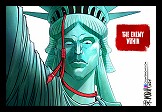 Sunday 'VOTE NOW!' Toons
Sunday 'VOTE NOW!' Toons Harris on Hope, Trump's Fasc-ism in Bumpy Closing Days: 'BradCast' 10/24/24
Harris on Hope, Trump's Fasc-ism in Bumpy Closing Days: 'BradCast' 10/24/24 'Green News Report' 10/24/24
'Green News Report' 10/24/24 Kelly on Trump: 'Fascist', Admires Hitler, Disrespects Constitution and Disabled Vets: 'BradCast' 10/23/24
Kelly on Trump: 'Fascist', Admires Hitler, Disrespects Constitution and Disabled Vets: 'BradCast' 10/23/24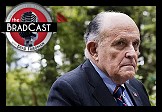 Accountability Comes For Rudy, Other Election Deniers: 'BradCast' 10/22/24
Accountability Comes For Rudy, Other Election Deniers: 'BradCast' 10/22/24 'Green News Report' 10/22/24
'Green News Report' 10/22/24 Elon Musk's 'Vote Buying' and Lying for Trump: 'BradCast' 10/21/24
Elon Musk's 'Vote Buying' and Lying for Trump: 'BradCast' 10/21/24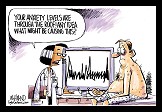 Sunday 'High Anxiety' Toons
Sunday 'High Anxiety' Toons 'Green News Report' 10/17/24
'Green News Report' 10/17/24 Fake v. Real Censorship and Trump/Fox Fetish-ized Grievance World: 'BradCast' 10/17/24
Fake v. Real Censorship and Trump/Fox Fetish-ized Grievance World: 'BradCast' 10/17/24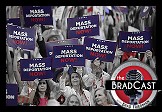 'Americans Aren't Prepared for Trump's Police State': 'BradCast' 10/16/24
'Americans Aren't Prepared for Trump's Police State': 'BradCast' 10/16/24 Good News for Georgia Voters, the Economy and Kamala Harris: 'BradCast' 10/15/24
Good News for Georgia Voters, the Economy and Kamala Harris: 'BradCast' 10/15/24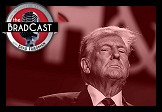 Fascism Comes to America: 'BradCast' 10/14/24
Fascism Comes to America: 'BradCast' 10/14/24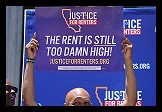 Institutional Landlords Flood CA Voters With Deceptive Ads on Props 33 and 34
Institutional Landlords Flood CA Voters With Deceptive Ads on Props 33 and 34 Milton's Mess, FL's U.S. House Liars, Trump's Made-in-China Bibles: 'BradCast' 10/10/24
Milton's Mess, FL's U.S. House Liars, Trump's Made-in-China Bibles: 'BradCast' 10/10/24 Whistleblower Org Readies to Support Election Officials: 'BradCast' 10/9/24
Whistleblower Org Readies to Support Election Officials: 'BradCast' 10/9/24 Florida Braces for 'Devastating to Catastrophic' Milton: 'BradCast' 10/8/24
Florida Braces for 'Devastating to Catastrophic' Milton: 'BradCast' 10/8/24
 VA GOP VOTER REG FRAUDSTER OFF HOOK
VA GOP VOTER REG FRAUDSTER OFF HOOK Criminal GOP Voter Registration Fraud Probe Expanding in VA
Criminal GOP Voter Registration Fraud Probe Expanding in VA DOJ PROBE SOUGHT AFTER VA ARREST
DOJ PROBE SOUGHT AFTER VA ARREST Arrest in VA: GOP Voter Reg Scandal Widens
Arrest in VA: GOP Voter Reg Scandal Widens ALL TOGETHER: ROVE, SPROUL, KOCHS, RNC
ALL TOGETHER: ROVE, SPROUL, KOCHS, RNC LATimes: RNC's 'Fired' Sproul Working for Repubs in 'as Many as 30 States'
LATimes: RNC's 'Fired' Sproul Working for Repubs in 'as Many as 30 States' 'Fired' Sproul Group 'Cloned', Still Working for Republicans in At Least 10 States
'Fired' Sproul Group 'Cloned', Still Working for Republicans in At Least 10 States FINALLY: FOX ON GOP REG FRAUD SCANDAL
FINALLY: FOX ON GOP REG FRAUD SCANDAL COLORADO FOLLOWS FLORIDA WITH GOP CRIMINAL INVESTIGATION
COLORADO FOLLOWS FLORIDA WITH GOP CRIMINAL INVESTIGATION CRIMINAL PROBE LAUNCHED INTO GOP VOTER REGISTRATION FRAUD SCANDAL IN FL
CRIMINAL PROBE LAUNCHED INTO GOP VOTER REGISTRATION FRAUD SCANDAL IN FL Brad Breaks PA Photo ID & GOP Registration Fraud Scandal News on Hartmann TV
Brad Breaks PA Photo ID & GOP Registration Fraud Scandal News on Hartmann TV  CAUGHT ON TAPE: COORDINATED NATIONWIDE GOP VOTER REG SCAM
CAUGHT ON TAPE: COORDINATED NATIONWIDE GOP VOTER REG SCAM CRIMINAL ELECTION FRAUD COMPLAINT FILED AGAINST GOP 'FRAUD' FIRM
CRIMINAL ELECTION FRAUD COMPLAINT FILED AGAINST GOP 'FRAUD' FIRM RICK SCOTT GETS ROLLED IN GOP REGISTRATION FRAUD SCANDAL
RICK SCOTT GETS ROLLED IN GOP REGISTRATION FRAUD SCANDAL VIDEO: Brad Breaks GOP Reg Fraud Scandal on Hartmann TV
VIDEO: Brad Breaks GOP Reg Fraud Scandal on Hartmann TV RNC FIRES NATIONAL VOTER REGISTRATION FIRM FOR FRAUD
RNC FIRES NATIONAL VOTER REGISTRATION FIRM FOR FRAUD EXCLUSIVE: Intvw w/ FL Official Who First Discovered GOP Reg Fraud
EXCLUSIVE: Intvw w/ FL Official Who First Discovered GOP Reg Fraud GOP REGISTRATION FRAUD FOUND IN FL
GOP REGISTRATION FRAUD FOUND IN FL



























 Today on
Today on 
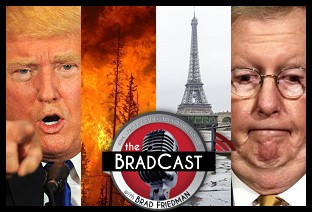 On today's
On today's  On today's
On today's 
 On today's
On today's  On today's
On today's 
 On today's
On today's 
 On today's
On today's 














